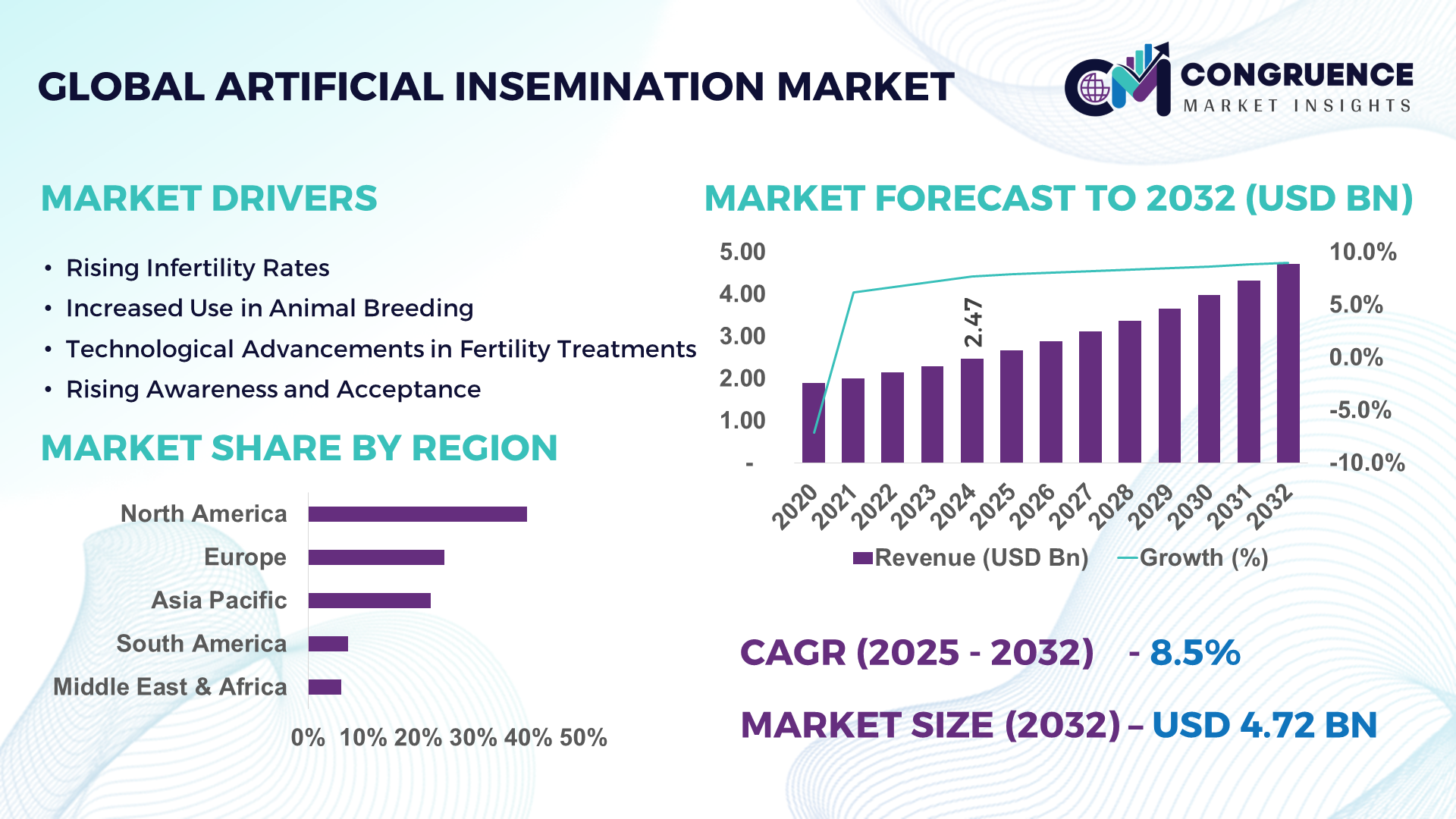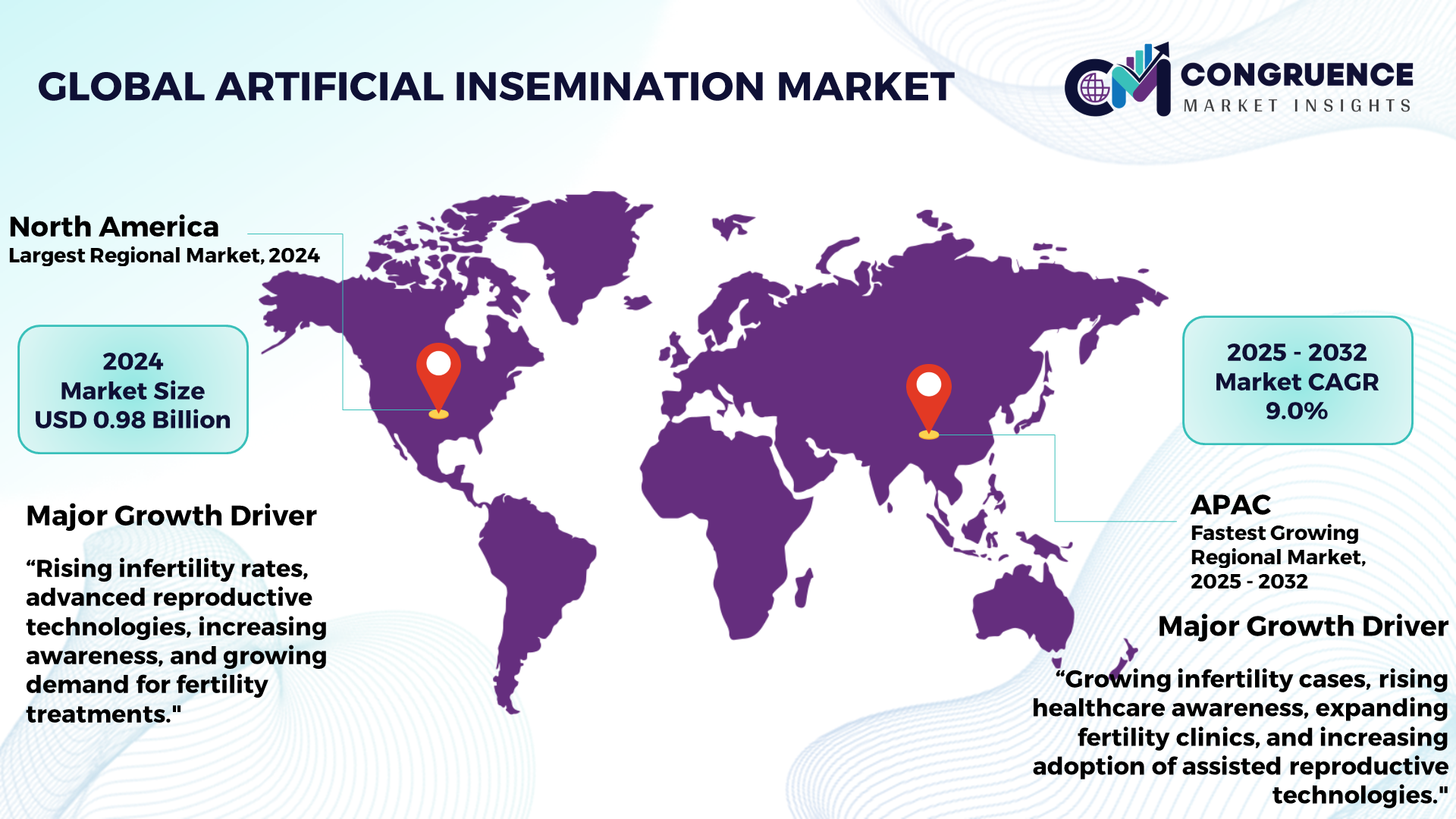Reports
Artificial Insemination Market Report Overview
The Global Artificial Insemination Market was valued at USD 2.47 Billion in 2024 and is anticipated to reach a value of USD 4.72 Billion by 2032 expanding at a CAGR of 8.5% between 2025 and 2032. This growth of this market is driven by increased fertility challenges due to lifestyle changes, delayed pregnancies, and the rise in same-sex couples selecting for children. Additionally, the increasing use of artificial insemination in veterinary applications, especially for cow breeding, helps in market expansion.

To Learn More About This Report, Request A Free Sample Copy
Artificial insemination is a frequently used assisted reproductive technology (ART) that includes the direct injection of sperm into a woman's cervix or uterus to achieve conception. It is typically utilized when couples face difficulty with natural conception or when donor sperm is needed due to male infertility or same-sex relationships. The market is gaining traction, not just for human uses but also for animal breeding, particularly in cattle, where artificial insemination is utilized to boost breeding efficiency and assure the dissemination of desirable traits.
Advancements in fertility treatments, the increased usage of intrauterine insemination (IUI), and greater awareness about infertility options are creating a favorable environment for market expansion. Fertility clinics, hospitals, and veterinary centers are essential players that provide these services, enabling people and businesses to exploit artificial insemination procedures for fertility and animal breeding objectives. Furthermore, government backing and investments in fertility treatment facilities have also encouraged industry expansion.
How AI is Transforming Artificial Insemination Market
Artificial Intelligence (AI) is playing a vital role in changing the artificial insemination market by raising diagnostic accuracy, improving treatment outcomes, and reducing operational processes. AI-powered algorithms can now assist fertility professionals in identifying optimal sperm and egg combinations, maximizing the odds of successful insemination. By analyzing huge volumes of patient data, AI helps uncover trends in fertility disorders, enabling individualized treatment strategies that improve the likelihood of pregnancy.
AI is also contributing to increased timing and precision in insemination techniques. In fertility treatments, AI-driven ovulation tracking devices can assist monitor a woman's hormonal cycles more accurately, ensuring insemination occurs during the most fertile period. In the field of veterinary breeding, AI helps determine appropriate breeding dates for cattle, raising success rates and saving expenses for farmers.
Additionally, AI plays a crucial role in managing massive databases relating to genetic information, sperm quality, and patient histories, decreasing human error and optimizing decision-making processes in reproductive clinics and animal breeding centers. As AI technology continues to evolve, its application in artificial insemination will expand, resulting to higher success rates and increased patient satisfaction.
Artificial Insemination Market Major Driving Forces
· Rising Infertility Rates: The growing prevalence of infertility due to lifestyle factors, delayed pregnancies, and health issues such as PCOS is boosting demand for artificial insemination therapies. Many couples are resorting to ART options like IUI and ICI to boost their chances of conception.
· Increased Use in Animal Breeding: Artificial insemination is becoming a regular procedure in animal breeding, notably for cattle and pigs. The capacity to manage breeding cycles and boost genetic quality is an important driver in the veterinary market.
· Technological Advancements in Fertility therapies: Advances in reproductive technology, including AI-driven sperm selection, hormone monitoring, and minimally invasive procedures, are improving success rates in artificial insemination, leading more individuals to seek these therapies.
· Rising Awareness and Acceptance: Increased awareness about fertility treatments and a growing acceptance of assisted reproductive technologies are leading more individuals and couples to seek artificial insemination options. Educational activities and public attention have contributed to decreasing the stigma associated with infertility treatments.
Artificial Insemination Market Key Opportunities
· Expansion of Fertility Clinics in Developing Regions: The growing number of fertility clinics in emerging markets such as India, China, and Brazil presents a substantial opportunity for market expansion. As healthcare infrastructure improves and awareness of fertility treatments develops, these regions are projected to see a surge in demand for artificial insemination services.
· AI-Driven Reproductive Solutions: The incorporation of AI technologies into reproductive treatment regimens offers tremendous prospects to improve conception success rates. AI-based diagnostic tools, sperm selection systems, and cycle tracking technology are offering new paths for more precise and tailored therapies.
· Animal Breeding in Emerging economies: Artificial insemination is witnessing significant use in the animal breeding business across emerging economies, particularly in Asia and Africa, where livestock production is crucial for economic development. This creates an increasing demand for AI-based breeding management systems.
· Sustainability and Ethical Animal Breeding: There is rising interest in ethical and sustainable breeding procedures, notably in the veterinary industry. Artificial insemination techniques that ensure animal welfare and maximize breeding efficiency provide tremendous potential for market expansion.
Artificial Insemination Market Key Trends
· The increased acceptance of single motherhood, same-sex couples, and individuals deferring parenthood has led to a spike in demand for donor sperm services, driving the market for artificial insemination.
· The usage of AI-driven ovulation tracking and fertility monitoring technologies is becoming a trend, giving increased accuracy and better timing for insemination procedures. These devices eliminate the need for invasive monitoring and improve patient convenience.
· In the animal breeding segment, the integration of AI and machine learning into breeding programs is gaining traction. This allows farmers to optimize breeding schedules, monitor animal health, and pick the best prospects for reproduction based on genetic study.
· There is an increasing demand for hybrid fertility solutions that combine traditional approaches with innovative technology like AI, big data analytics, and less invasive treatments. This development is boosting the accessibility and effectiveness of artificial insemination therapies.
Region-wise Market Insights
North America accounted for the largest market share at 39.7% in 2024 however, Asia Pacific is expected to register the fastest growth, expanding at a CAGR of 9.0% between 2025 and 2032.

To Learn More About This Report, Request A Free Sample Copy
North America held the largest market share in 2024. This dominance is fueled by the high adoption of fertility treatments, modern healthcare infrastructure, and increasing demand for assisted reproductive technologies. The United States, in particular, is a prominent player, supported by a wide network of fertility clinics and advantageous reimbursement rules.
· In June 2024, CooperSurgical announced the acquisition of Zymot Fertility, a company known for its innovative sperm separation technology used in assisted reproductive treatments. This acquisition is expected to enhance CooperSurgical's fertility product offerings, further supporting the company’s mission to improve outcomes in fertility care and reproductive health.
The Asia Pacific area is predicted to have the highest development, rising at a 9.0% CAGR from 2025 to 2032. Factors such as rising infertility rates, increased knowledge of fertility treatments, and improving healthcare infrastructure in countries like China, India, and Japan are contributing to the market’s expansion. The region is also seeing major investment in animal breeding initiatives, further encouraging market expansion.
Europe is enjoying continuous expansion thanks to government assistance for reproductive treatments and a rising number of fertility clinics across the area. Countries like the UK and Germany are important contributors to the market due to favorable legislative frameworks and modern reproductive technology.
The Middle East & Africa and Latin America areas are also witnessing moderate market expansion, driven by improved knowledge and access to fertility treatments, especially in metropolitan centers.
Recent Developments
· In May 2024, Vitrolife AB (publ) completed the acquisition of eFertility, a company specializing in fertility software solutions. This acquisition aims to strengthen Vitrolife's position in the fertility treatment market, enhancing its portfolio with eFertility's advanced digital tools that support the entire fertility clinic process. This move reflects Vitrolife’s strategy to provide comprehensive solutions in assisted reproduction technologies, combining lab and digital innovations.
· In June 2022, Pinnacle Fertility partnered with Igenomix, making Igenomix their exclusive genetics laboratory and genetic counseling provider. This collaboration aims to enhance the fertility care experience by offering genetic testing and counseling services, ultimately helping patients make informed decisions about their reproductive health. Pinnacle Fertility’s partnership with Igenomix will provide access to advanced genetic solutions that are crucial for personalized and effective fertility treatment.
· In August 2021, Cryos International opened a sperm bank and donation center in Raleigh, North Carolina. This marks a significant expansion for Cryos, a global leader in sperm and egg banking. The facility aims to offer state-of-the-art services to donors and families seeking reproductive assistance. Cryos' Raleigh location is expected to play a key role in providing high-quality donor sperm to patients in need, while also supporting research and advancements in reproductive health.
Market Competition Landscape
The global artificial insemination industry is extremely competitive, with prominent competitors focused on growing their service offerings and technological capabilities. Major competitors in the market are spending extensively in AI-driven fertility treatments, as well as growing their presence in emerging regions.
Key initiatives in this market include mergers, acquisitions, and alliances to improve market penetration and provide comprehensive fertility services. The increased demand for AI-powered products is pushing enterprises to innovate and differentiate their offerings. Sustainability and ethical standards in animal breeding are also becoming crucial to the competitive landscape, notably in the veterinary industry.
Key players in the global artificial insemination market implement various organic and inorganic strategies to strengthen and improve their market positioning. Prominent players in the market include:
· Cryos International
· CooperSurgical
· IGENOMIX
· Vitrolife
· Genea Limited
· Fairfax Cryobank
· Xytex Corporation
· ReproTech
· California Cryobank
· Merck KGaA
· LabCorp
· Rinovum Women’s Health
· Pride Angel
· Cook Medical
|
Report Attribute/Metric |
Details |
|
Market Revenue in 2024 |
USD 2.47 Billion |
|
Market Revenue in 2032 |
USD 4.72 Billion |
|
CAGR (2025 – 2032) |
8.5% |
|
Base Year |
2024 |
|
Forecast Period |
2025 – 2032 |
|
Historical Data |
2020 to 2024 |
|
Forecast Unit |
Value (US$ Bn) |
|
Key Report Deliverable |
Revenue Forecast, Growth Trends, Market Dynamics, Segmental Overview, Regional and Country-wise Analysis, Competition Landscape |
|
Segments Covered |
· By Type (Intrauterine Insemination (IUI), Intracervical Insemination (ICI), Intratubal Insemination (ITI), and Intrafollicular Insemination (IFI)) · By Source (Donor Sperm and Partner Sperm) · By End-User (Fertility Clinics, Hospitals, and Veterinary Clinics) · By Application (Fertility Treatment and Animal Breeding) |
|
Geographies Covered |
North America: U.S., Canada and Mexico Europe: Germany, France, U.K., Italy, Spain, and Rest of Europe Asia Pacific: China, India, Japan, South Korea, Southeast Asia, and Rest of Asia Pacific South America: Brazil, Argentina, and Rest of Latin America Middle East & Africa: GCC Countries, South Africa, and Rest of Middle East & Africa |
|
Key Players Analyzed |
Cryos International, CooperSurgical, IGENOMIX, Vitrolife, Genea Limited, Fairfax Cryobank, Xytex Corporation, ReproTech, California Cryobank, Merck KGaA, LabCorp, Rinovum Women’s Health, Pride Angel, Cook Medical |
|
Customization & Pricing |
Available on Request (10% Customization is Free) |
